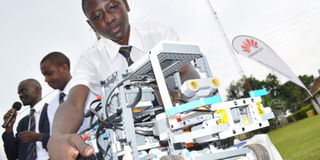Students make car to reduce accidents

The team that assembled the robot pose for a picture with their teachers, officials from Huawei, ICT Ministry and Makerere University.
Photo By Rachel Mabala.
What you need to know:
Hope. The invention puts Ugandan mechanics on the road to realising a dream to make vehicles that would solve many of today’s traffic problems. And what’s more; it is a home grown idea.
Imagine you are seated in a car operating itself in a traffic jam with such other features as being able to sense all objects aound it. It cannot hit the car in front, behind or on the sides. This is the kind of comfort anyone would dream of, especially in Uganda, where road accidents are frequent.
But before you bury this dream, students of St. Mary’s College Kisubi (Smack) are on the way to making it real. They have developed a robotic car that would enable auto-drive on busy city roads.
The car, developed by the Smack Robotics Club, has features like traffic jam auto drive which enables the car to maintain a safe distance between it and the car in front.
The car also has accident detection system that will enable it send an automated alert to police, hospital and loved ones while indicating the scene of accident.
The car was unveiled last month as Huawei Technologies, Uganda went to reward the school and students for their innovation in the company’s Sow the Seed in the Young Generation Programme in schools that will go a long way to promote development in science and technology innovations.
And to ensure that innovations are kept flowing at Smack, Huawei donated 20 computers and an assortment of internet accessories to the school.
Financial rewards
Each of the 12 students behind the hybrid car also received school fees worth Shs800,000.
According to Mr Eric Yang, the executive director, Huawei Uganda, enhancing ICT in education remains vital if Uganda us to achieve its Millennium development goals and “this e-lab seeks to open up a world of opportunity for students to gather invaluable life-long knowledge to realise full potential”.
To prove that Uganda is rapidly growing in the field of ICT, it recently bagged the World Summit Award for Mobile Apps and it was the only other African country after Nigeria to receive the award, being among the 40 final contest winners.
“This is proof that our local ICT industry is growing strong and therefore the need to invest more to connect young people so as to compete confidently with the rest of the world,” Mr Yang added.
ICT ministry Permanent Secretary, Jimmy Saamanya said the move by Huawei to reward the best innovative students and schools would greatly improve science and technology in the country.
“This is in line with the government’s effort to integrate ICT into mainstream education curricula as well as other literacy programmes to provide for equitable access for all students regardless of their level,” Dr Saamanya added.
The brain behind the prototype Kiira EV produced at Makerere University months ago, Prof Sandy Stevens Tickodri-Togboa, said they would take up the components developed by Smack students and incorporate them into their car.
“The transformation of this nation rests in the ability to nurture home-grown competent professionals, who will lead the way, especially in championing technological advancement, required for our nation’s growth,” Prof. Togboa said.




